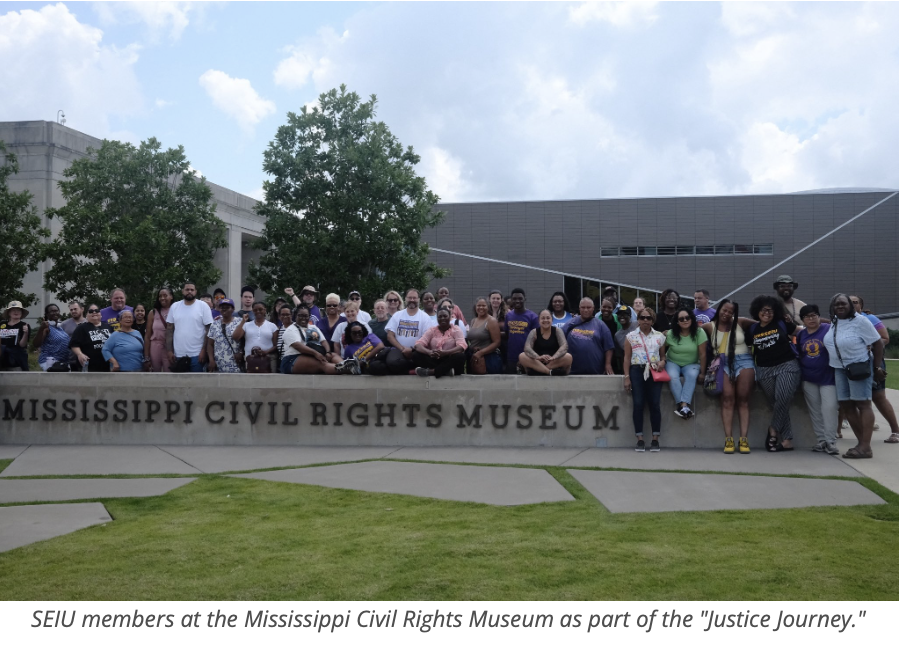MSEA-SEIU 1989 Members Reflect on SEIU’s "Justice Journey” Through the South

Last month, two members of the Maine Service Employees Association (MSEA-SEIU 1989) joined SEIU’s “Justice Journey, retracing the freedom rides of the Civil Rights Movement to Louisiana to protest at an ICE detention camp against the Trump administration’s attacks on due process, family separations and immigration raids on workers, some of whom are SEIU members.
As part of its “Solidarity Summer,” SEIU is demanding an end to the Immigrant Customs Enforcement (ICE) raids on working class communities and releases people from “unjust detention and returns them safely to their families and communities.”
“One of the things that I wanna bring back from this trip to Maine and to MSEA is the understanding that all this is about workers,” said MSEA President Mark Brunton. “It's about workers' rights. Black, white, immigrant, nonimmigrant, illegal, legal. The status doesn’t matter.”
Brunton and Preble Street United (MSEA) member Colleen Ryan were among the 175 SEIU members from New England and New York who set off on the journey in buses from New York City. Other buses left from Chicago, Los Angeles and other cities throughout the nation. They first visited the Tennessee Immigrant and Refugee Rights Center. The group provided an overview of the work it does organizing immigrants, refugees and faith groups to protect immigrant rights. After that they visited the National Civil Rights Museum in Memphis, which is built around the Lorraine Motel where Dr. Martin Luther King was assassinated in 1968.
According to a dispatch from MSEA, one SEIU member was “reminded of the power and responsibility that unions like SEIU carry in the fight to protect and advance our rights. The March on Washington, where The Rev. Dr. Martin Luther King Jr. shared his dream, was not only a call for freedom—it was a call for jobs and economic justice as well.”

The Justice Journey group arrived on July 2 in Louisiana to visit ICE detention camps in Jena and Basile. Ryan said what struck her about the facilities was how far “in the middle of nowhere they were” and “how scary it must be to find yourself in an ICE detention center. One SEIU member noted, "These detention facilities are meant to break you," one SEIU member said. "It's purposely awful. It's purposely cruel. People take their lives."
Ryan said she was also able to attend workshops on how to build a community support network to keep people safe from ICE and another one called “ICE proofing your workplace.” She said she did a recap of some of things she learned at her union’s monthly meeting so that stewards could start thinking about making a safety plan in the workplace. She said fortunately ICE has not done any raids on Preble Street facilities.
“The presenters down in Louisiana pointed out that getting a judge to sign a warrant [for ICE] for a homeless shelter, a food pantry or other social service is pretty unlikely,” said Ryan. “It's easier and quieter for them to detain people in traffic stops or at immigration offices or something like that. But, also, part of me is, like, ‘God forbid, who knows what way things will go?’”
Ryan said one of the highlights of the trip was learning about the labor struggles where black sharecroppers and white sharecroppers put aside their differences and organized with the understanding that “all of us are kind of under the same boot.”
Brunton said the trip reinforced his understanding of how racism is used to divide workers and prevent them from seeing their common interests.
“If it's the last thing I do, I'm going to spend the rest of my life working to change that here in Maine,” he said. “I'm not going to sugarcoat these issues. I'm going to tell our members the truth, and I know there are those amongst our members who will vehemently disagree. But at some point, the onus is on them to defend that racist xenophobic position.”
